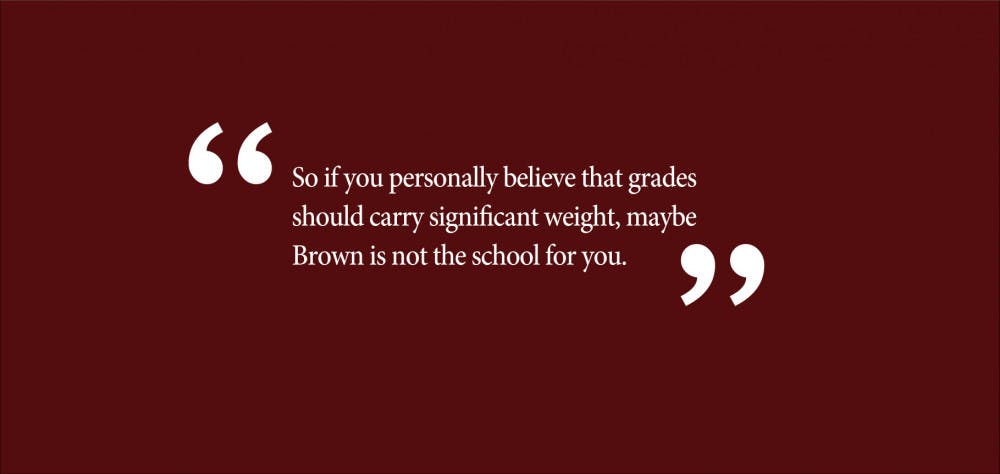Last week, I read a column in The Herald titled “Brown is hard. It should be harder,” which advocated for intensified grading practices on campus. The argument was premised on the belief that too many students skate by, taking classes that do not require much work; they are enabled to have it all, including a high GPA and a robust list of extracurriculars. I respectfully disagree with this argument.
For the subset of students who load up on the classes that “allow (them) to skate by without much sustained effort,” this decision is not without cost. I therefore hesitate to call it “unfair” that some students graduate with high GPAs simply for taking the easy route — their costs exist, even if they do not show up on a transcript. Our education is only as good as we make it. Students who take classes that are easy for them may receive higher grades than they otherwise would with a more challenging course load, but they are simultaneously hurting themselves by not pushing themselves intellectually. In my opinion, that’s just their loss. These students will walk away from Brown with less knowledge, and knowledge ultimately does much more for us in life than our college GPA.
I’m all for rewarding — or somehow recognizing — students who opt to take challenging courses. This already happens in some capacity; most employers and graduate schools take into account the types of classes students take, not merely their grades. I just do not believe that doing away with low work load classes altogether is the answer, particularly since defining one class as less demanding or challenging than another is a subjective matter. At every university, some classes will require less work than others, and ultimately the people at Brown who take advantage of this fact constitute the definite minority of the student body. Most people I meet at Brown strive to challenge themselves academically and take engaging courses, as Brown attracts particularly self-motivated applicants and is extremely selective in the students it accepts.
This stems back to Brown’s open curriculum, which compels students to create schedules that are best-suited for their own needs. The academic freedom allows students to make their time here a unique and individual learning experience. The goal is for students to be focused on what they are doing and not on the work of others. This is underscored by the fact that Brown does not use grade deflation. One student’s course load and academic performance does not affect another’s, and there is often no limit to the number of As professors can give out. A more concerted effort to regulate courses insinuates a comparison between students’ academic performances and therefore directly undermines Brown’s educational framework and open curriculum. Brown is a school focused on learning, not grades. We don’t even calculate GPA. So if you personally believe that grades should carry significant weight, maybe Brown is not the school for you.
When it comes to students who “do it all,” maintaining both rigorous extracurriculars and high GPAs, I caution in Calvelli’s advocacy for more of a trade-off between the two. Without an exceptional academic record, our odds of getting in to Brown would have been slim. We grew up in an environment where this concrete, external measure of our success and intelligence seemed to define who we were as students. It is a bit naive to imply that once in college, students should simply choose their extracurriculars over their GPA if that is “where they think their time is best spent.” The desire to maintain a high GPA has been ingrained in us for years. If forced into a tradeoff between academics and extracurriculars, many students would always choose their academics, as we have been conditioned to be extrinsically motivated by grades.
I know I would. If academics were significantly more difficult at Brown, I would devote more of my limited time to them, and I likely would not be writing for The Herald, working a student job or doing any other extracurriculars.
Ultimately, a decrease in extracurricular activity is to both the University’s and students’ detriment. In a job setting, you don’t get grades. You don’t get a gold star every time you correctly complete a financial model or diagnose a patient. There is far less external validation from superiors in the professional world. Extracurriculars in college therefore serve as a crucial supplement to our time spent on coursework. In the absence of grades, extracurriculars teach students to be intrinsically motivated, and they exist for students to explore interests that can be nurtured into a future career. Further, they offer invaluable experience with leadership, project management and collaboration, which better equips students to feel comfortable in such environments after graduation.
This is not to say that class is not important or that we should do away with grades. Obviously we come to Brown first and foremost to further our academic education, and grades are necessary for applications to graduate programs and jobs. Extracurriculars simply teach us more about the ways we can and should feel motivated aside from grades, as well as the ways we can move toward a workplace mentality. If classes were harder, I worry our collective emphasis on extracurriculars would diminish, making us worse off as a student body.
Ultimately, Brown’s open curriculum promotes learning in all forms and gives us the freedom to make choices in how we pursue our education. This freedom teaches students to challenge themselves in a way that goes far deeper than a number on a transcript.
Anna B. Kramer ’20 can be reached at anna_kramer@brown.edu. Please send responses to this opinion to letters@browndailyherald.com and op-eds to opinions@browndailyherald.com.



